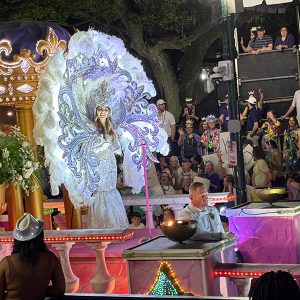What is special about hotels in Hungary? A recent four-day tour on behalf of Silver Travel Advisor gave me some answers. Brilliantly organised by Anita Sipos of Hungarian Tourism Ltd., this short trip, based upon the centres of Budapest, Eger and Debrecen, gave an insight into some of the best places to stay while enjoying Hungarian culture, nature and wine. And the strongest impressions were of the elegance of architecture, the warmth of welcome, and the relaxing spa culture based on the salt-laden thermal springs found all over the country.
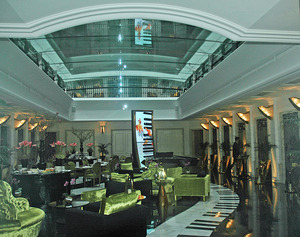 Sheer elegance and splendour was best seen in the capital Budapest. This was epitomized by the five-star Aria Hotel, with its four wings based on Classical, Opera, Jazz and Contemporary music themes. Décor in each wing matches the theme and appropriate background music plays in corridors. Rooms are arranged around a central atrium with balconies giving a view though glass to the elegant and comfortable ‘music garden’ below, where complimentary coffee, mineral water and fresh fruit are available. Here stands the famous piano, designed by Hungarian virtuoso Gergely Bogány, on which recitals are given on Fridays and Saturdays.
Sheer elegance and splendour was best seen in the capital Budapest. This was epitomized by the five-star Aria Hotel, with its four wings based on Classical, Opera, Jazz and Contemporary music themes. Décor in each wing matches the theme and appropriate background music plays in corridors. Rooms are arranged around a central atrium with balconies giving a view though glass to the elegant and comfortable ‘music garden’ below, where complimentary coffee, mineral water and fresh fruit are available. Here stands the famous piano, designed by Hungarian virtuoso Gergely Bogány, on which recitals are given on Fridays and Saturdays.
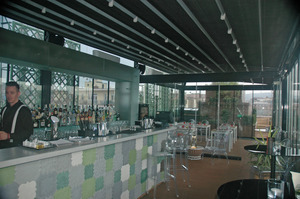 As well as a beautiful music-themed restaurant, cosy salons and bars and the rooftop sky bar, with views over the city and nearby St. Stephen’s Basilica, guests are offered complimentary access to a heated swimming pool, jacuzzi, sauna and steam bath. Treatments with thermal spring water and wine extracts are available.
As well as a beautiful music-themed restaurant, cosy salons and bars and the rooftop sky bar, with views over the city and nearby St. Stephen’s Basilica, guests are offered complimentary access to a heated swimming pool, jacuzzi, sauna and steam bath. Treatments with thermal spring water and wine extracts are available.
Equally full of character, yet in complete contrast, the five-star Budapest Buddha Bar Hotel occupies the historic 1905 extravagantly neo-Baroque Klotild Palace, 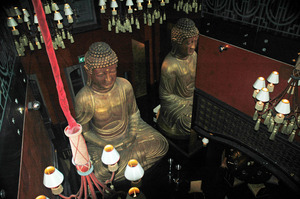 refurbished internally in the lush yellow and gold décor of this concept hotel group. Though without religious affiliation, images of Buddha, rich colours and subdued lighting engender a meditative atmosphere. As in the Aria, rooms are luxurious, with complimentary Nespresso coffee, plus sound and wireless internet services. A massive gilded Buddha presides over the Asian-French fusion restaurant and a range of Asian-inspired treatments, baths and saunas are offered in the ‘Buddhattitude’ spa.
refurbished internally in the lush yellow and gold décor of this concept hotel group. Though without religious affiliation, images of Buddha, rich colours and subdued lighting engender a meditative atmosphere. As in the Aria, rooms are luxurious, with complimentary Nespresso coffee, plus sound and wireless internet services. A massive gilded Buddha presides over the Asian-French fusion restaurant and a range of Asian-inspired treatments, baths and saunas are offered in the ‘Buddhattitude’ spa.
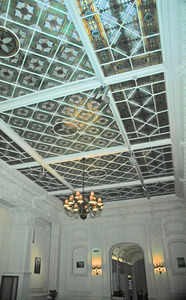 For warmth of welcome and restrained elegance, however, the four-star Hotel Nemzeti (National Hotel) would be hard to beat. Our base while in Budapest, this dates from the Hungarian millennium of 1896 and for many years was linked by tunnel to the National Theatre across the street, used by actors who stayed in the hotel. Renovated in 2012, it persists as a centre for the arts, with works by local artists changed every six months on its walls. Comfortable rooms, an excellent breakfast selection in art nouveau surroundings, and friendly staff, added up to a delightful stay.
For warmth of welcome and restrained elegance, however, the four-star Hotel Nemzeti (National Hotel) would be hard to beat. Our base while in Budapest, this dates from the Hungarian millennium of 1896 and for many years was linked by tunnel to the National Theatre across the street, used by actors who stayed in the hotel. Renovated in 2012, it persists as a centre for the arts, with works by local artists changed every six months on its walls. Comfortable rooms, an excellent breakfast selection in art nouveau surroundings, and friendly staff, added up to a delightful stay.
The recently rebuilt four-star Prestige Hotel, in the heart of the city, strives after a similar level of elegance, behind its original 1860 façade. 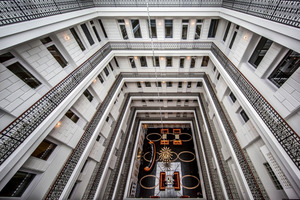 Layout and furniture were produced by Hungarian designers and craftsmen. A central lobby based on the original courtyard is surrounded by rooms on five floors, all with overlooking balconies. Unfortunately, guests are discouraged from using the undivided balconies for safety and privacy reasons, an issue which the Aria Hotel seems to have overcome. A key positive feature, however, is the opening in the hotel of a Costes Downtown restaurant, whose chef has achieved Hungary’s first Michelin star at the existing Costes Downtown restaurant in the city.
Layout and furniture were produced by Hungarian designers and craftsmen. A central lobby based on the original courtyard is surrounded by rooms on five floors, all with overlooking balconies. Unfortunately, guests are discouraged from using the undivided balconies for safety and privacy reasons, an issue which the Aria Hotel seems to have overcome. A key positive feature, however, is the opening in the hotel of a Costes Downtown restaurant, whose chef has achieved Hungary’s first Michelin star at the existing Costes Downtown restaurant in the city.
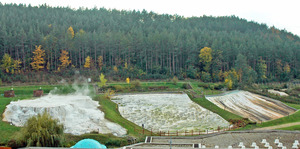 In the village of Egerzalók, 8 km South-West of the city of Eger, is an amazing spectacle, where lime dissolved in hot springs precipitates at the surface, creating a steaming ‘salt hill’ – actually of travertine, a form of limestone. The warm spring water, still rich in minerals, provides a resource for the unique four-star Saliris Spa Hotel, with its range of seventeen indoor and outdoor thermal and fresh water pools, medicinal baths, saunas and jacuzzi. A huge range of therapeutic and beauty treatments is available, including various massages and red grape or chocolate therapies!
In the village of Egerzalók, 8 km South-West of the city of Eger, is an amazing spectacle, where lime dissolved in hot springs precipitates at the surface, creating a steaming ‘salt hill’ – actually of travertine, a form of limestone. The warm spring water, still rich in minerals, provides a resource for the unique four-star Saliris Spa Hotel, with its range of seventeen indoor and outdoor thermal and fresh water pools, medicinal baths, saunas and jacuzzi. A huge range of therapeutic and beauty treatments is available, including various massages and red grape or chocolate therapies! 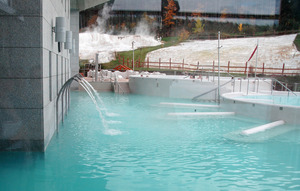 All rooms have easy access by lifts with Braille panels and there are four specific rooms adapted for guests with disabilities.
All rooms have easy access by lifts with Braille panels and there are four specific rooms adapted for guests with disabilities.
Just 49km to the South of Eger, the Tisza Balneum Hotel offers not only extensive spa facilities, but access to the huge Lake Tisza, a tranquil wildlife haven, on whose shore it was built in 2008. It is the only four-star hotel on the lake, with balconies of all rooms giving beautiful views over the lake. A private beach and jetty allow swimming and boating from the hotel. Cold spring water is used for the large outdoor pool and thermal spring water for warm indoor pools, with sauna, steam room, jacuzzi, gym and ‘wellness’ treatments available. I was struck by the family-friendly nature of the hotel, with a huge children’s play room, games room and chalets for hire in the wooded grounds.
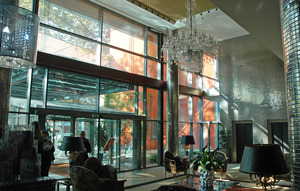 Hot springs extend over much of Hungary, including the Great Plains area in the East, where the second city Debrecen lies. Here a 200 year spa culture underlies the services of the five-star Divinus Hotel and the four-star Aquaticum Termál Hotel. Both are on the edge of the attractive Nagyerdei (Great Forest) Park area of Debrecen, easily accessible by tram from the city centre.
Hot springs extend over much of Hungary, including the Great Plains area in the East, where the second city Debrecen lies. Here a 200 year spa culture underlies the services of the five-star Divinus Hotel and the four-star Aquaticum Termál Hotel. Both are on the edge of the attractive Nagyerdei (Great Forest) Park area of Debrecen, easily accessible by tram from the city centre.
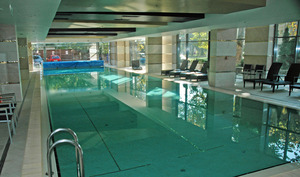 All the Divinus award-winning rooms are in a Classical style, providing a large range of choices from standard double ‘Superior’ room to the ‘Royal Suite’ with two bedrooms, office and dining room: all with excellent audio-visual and Internet facilities. The spa offers a 25 metre swimming pool as well as kid’s pool, a variety of saunas, steam room and jacuzzi facilities.
All the Divinus award-winning rooms are in a Classical style, providing a large range of choices from standard double ‘Superior’ room to the ‘Royal Suite’ with two bedrooms, office and dining room: all with excellent audio-visual and Internet facilities. The spa offers a 25 metre swimming pool as well as kid’s pool, a variety of saunas, steam room and jacuzzi facilities.
Even more extensive spa facilities were seen in the four-star Aquaticum Termál Hotel, whose spa was renovated a year ago.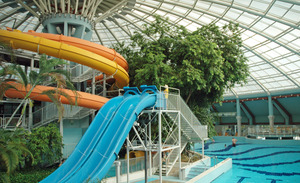 Indoor and outdoor pools at 20 to 38oC, have colours depending on the varied mineral content of thermal springs, and include strong spouts and water massage jets; while saunas and a salt cabin are also available. Lift access is available to all of the spa facilities and there is even apparatus for lowering those with limited mobility into the water. A separate huge ‘aqua-dome’ provides a ‘Mediterranean’ water playground for families and children and there are large fitness and play areas. All rooms have balconies and range from a standard double to a large two-room apartment. One interesting special feature is provision in the restaurant for a variety of types of food intolerance, including the design of special menus.
Indoor and outdoor pools at 20 to 38oC, have colours depending on the varied mineral content of thermal springs, and include strong spouts and water massage jets; while saunas and a salt cabin are also available. Lift access is available to all of the spa facilities and there is even apparatus for lowering those with limited mobility into the water. A separate huge ‘aqua-dome’ provides a ‘Mediterranean’ water playground for families and children and there are large fitness and play areas. All rooms have balconies and range from a standard double to a large two-room apartment. One interesting special feature is provision in the restaurant for a variety of types of food intolerance, including the design of special menus.
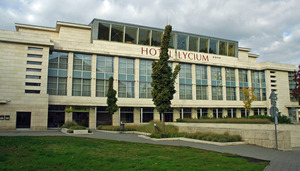 Our home in Debrecen was the four-star Lycium Hotel in the heart of the city and perfect for visiting the centre. Comfortable, functional and oriented towards business guests, I nevertheless felt that this lacked the intimacy and warmth of welcome of the Budapest Nemzeti, and the elegance of other hotels visited. And the washbasin lacked a plug!
Our home in Debrecen was the four-star Lycium Hotel in the heart of the city and perfect for visiting the centre. Comfortable, functional and oriented towards business guests, I nevertheless felt that this lacked the intimacy and warmth of welcome of the Budapest Nemzeti, and the elegance of other hotels visited. And the washbasin lacked a plug!
No tour of Hungary would be complete without a visit to the Tokaj wine region, where we viewed contrasting hotels in Tarcal and Mád. The five-star Andrássy Rezidencia Hotel, converted from a family hunting lodge in 2008, specialises in seven-course wine dinners and tastings, and organises wine tours in the region.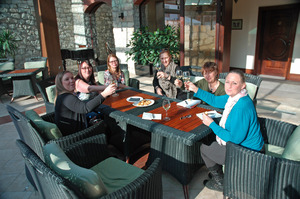 We were warmly welcomed in the lounge with traditional Hungarian Pogača bread rolls with cheese and cumin seeds, accompanied by Havas & Timár medium dry wine. Here the spa uses non-thermal spring water, with a swimming pool, jacuzzi and salt cabin; and offers a large range of ‘vinotherapy’ treatments based on grapes. Rooms range from a standard double to a large ‘Presidential’suite, with living room. Everywhere has good wheelchair access and there is one room specially adapted for guests with disabilities.
We were warmly welcomed in the lounge with traditional Hungarian Pogača bread rolls with cheese and cumin seeds, accompanied by Havas & Timár medium dry wine. Here the spa uses non-thermal spring water, with a swimming pool, jacuzzi and salt cabin; and offers a large range of ‘vinotherapy’ treatments based on grapes. Rooms range from a standard double to a large ‘Presidential’suite, with living room. Everywhere has good wheelchair access and there is one room specially adapted for guests with disabilities.
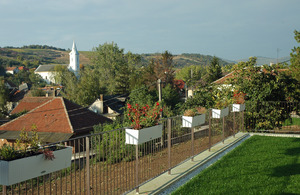 A wine theme is incorporated into the very name of the Botrytis Hotel in Mád, a village surrounded by vine-clad slopes. Botrytis cinerea is the Latin name of the valuable ‘noble rot’ fungus, which concentrates the sugar content of grapes to produce the sweet Aszú berries, crucial as additives to the traditional Tokaj. This small boutique hotel has four attractive well-proportioned double rooms and two large suites. But its advantage for wine lovers its location in the heart of the Tokaj region and its offer to guests of wine tasting and restaurant tours by dedicated mini-bus or, for the more adventurous, by a group cycling jaunt.
A wine theme is incorporated into the very name of the Botrytis Hotel in Mád, a village surrounded by vine-clad slopes. Botrytis cinerea is the Latin name of the valuable ‘noble rot’ fungus, which concentrates the sugar content of grapes to produce the sweet Aszú berries, crucial as additives to the traditional Tokaj. This small boutique hotel has four attractive well-proportioned double rooms and two large suites. But its advantage for wine lovers its location in the heart of the Tokaj region and its offer to guests of wine tasting and restaurant tours by dedicated mini-bus or, for the more adventurous, by a group cycling jaunt. 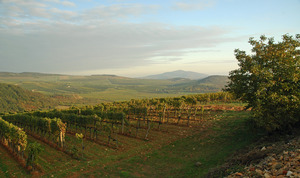 Fine dining at the associated Gusteau restaurant has menus based around Mád vineyard wines, and the restaurant also provides gourmet picnic baskets for enjoying on organised walking tours of the Szent Tamás vineyard, including tasting of its delicious wine.
Fine dining at the associated Gusteau restaurant has menus based around Mád vineyard wines, and the restaurant also provides gourmet picnic baskets for enjoying on organised walking tours of the Szent Tamás vineyard, including tasting of its delicious wine.
Fleeting visits to hotels cannot reflect the experience of staying in them, but our tour at least showed that there is an abundance of elegant, comfortable and characterful accommodation available in Hungary. Whether your enthusiasm is for history, architecture, nature, spa waters or wine, you should find a satisfying place to stay. Room rates are best checked on-line, but provide very good value in relation to UK prices, with various package deals also on offer. Almost all rooms and facilities are accessible by lift, exceptions being in the small Botrytis hotel in Mád and the chalets of the Tisza Balneum hotel.


